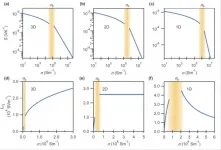Immune-stimulating drug before surgery shows promise in early-stage pancreatic cancer
For the first time, researchers led by SU2C "Dream Team" show how CD40 agonist drives an immune response to hard-to-penetrate tumors
2021-04-10
(Press-News.org) PHILADELPHIA--Giving early-stage pancreatic cancer patients a CD40 immune-stimulating drug helped jumpstart a T cell attack to the notoriously stubborn tumor microenvironment before surgery and other treatments, according to a new study from researchers in the Abramson Cancer Center (ACC) at the University of Pennsylvania. Changing the microenvironment from so-called T cell "poor" to T cell "rich" with a CD40 agonist earlier could help slow eventual progression of the disease and prevent cancer from spreading in more patients.
The data--which included 16 patients treated with the CD40 agonist selicrelumab--was presented today by Katelyn T. Byrne, PhD, an instructor of Medicine in the division of Hematology-Oncology in the Perelman School of Medicine at the University of Pennsylvania, during a plenary session at the American Association for Cancer Research annual meeting (Abstract #CT005).
"Many patients with early-stage disease undergo surgery and adjuvant chemotherapy. But it's often not enough to slow or stop the cancer," Byrne said. "Our data supports the idea that you can do interventions up front to activate a targeted immune response at the tumor site--which was unheard of five years ago for pancreatic cancer--even before you take it out."
The purpose of CD40 agonists is to help "push the gas" on the immune system both by activating antigen-presenting cells, such as dendritic cells, to "prime" T cells and by enhancing immune-independent destruction of the tumor site. The therapies have mostly been investigated in patients with metastatic pancreatic cancer patients in combination with other therapies, such as chemotherapy or other immunotherapies. This is the first time the drug has been shown to drive an immune response in early-stage patients both at the tumor site and systemically--which mirrors what researchers found in their mouse studies.
The phase 1b clinical trial was conducted at four sites, including the ACC, Fred Hutchinson Cancer Research Center at the University of Washington, Case Western Reserve University, and Johns Hopkins University.
Sixteen patients were treated with selicrelumab before surgery. Of those patients, 15 underwent surgery and received adjuvant chemotherapy and a CD40 agonist. Data collected from those patients' tumors and responses were compared to data from controls (patients who did not receive the CD40 agonist before surgery) treated at Oregon Health and Science University and Dana Farber Cancer Institute.
Multiplex imaging of immune responses revealed major differences between the two groups. Eighty-two percent of tumors in patients who received the CD40 agonist before surgery were T-cell enriched, compared to 37 percent of untreated tumors and 23 percent chemotherapy or chemoradiation-treated tumors. Selicrelumab tumors also had less tumor-associated fibrosis (bundles of tissue that prevent T cells and traditional therapies from penetrating tumors), and antigen-presenting cells known as dendritic cells were more mature.
In the treatment group, disease-free survival was 13.8 months and median overall survival was 23.4 months, with eight patients alive at a median of 20 months after surgery.
"This is a first step in building a backbone for immunotherapy interventions in pancreatic cancer," Byrne said.
Based on these findings, researchers are now investigating how other therapies combined with CD40 could help strengthen the immune response even further in pancreatic cancer patients before surgery.
"We're starting to turn the tide," said Robert H. Vonderheide, MD, DPhil, director of the ACC and senior author. "This latest study adds to growing evidence that therapies such as CD40 before surgery can trigger an immune response in patients, which is the biggest hurdle we've faced. We're excited to see how the next-generation of CD40 trials will take us even closer to better treatments."
INFORMATION:
ELSE PRESS RELEASES FROM THIS DATE:
2021-04-10
LOS ANGELES -- Early results from a new, pioneering chimeric antigen receptor (CAR) T cell immunotherapy trial led by researchers at the UCLA Jonsson Comprehensive Cancer Center found using a bilateral attack instead of the conventional single-target approach helps minimizes treatment resistance, resulting in long-lasting remission for people with non-Hodgkin's B-cell lymphoma that has come back or has not responded to treatment.
The new approach, which will be presented at the American Association for Cancer Research Annual Meeting during one of the clinical oral plenary sessions ( END ...
2021-04-10
New York, NY (April 10, 2021) - A personalized cancer vaccine developed with the help of a Mount Sinai computational platform raised no safety concerns and showed potential benefit in patients with different cancers, including lung and bladder, that have a high risk of recurrence, according to results from an investigator-initiated phase I clinical trial presented during the virtual American Association for Cancer Research (AACR) Annual Meeting 2021, held April 10-15.
"While immunotherapy has revolutionized the treatment of cancer, the vast majority of patients do not experience a significant clinical response with such treatments," said study author Thomas Marron, MD, PhD, Assistant Director for Early Phase and Immunotherapy Trials ...
2021-04-10
HOUSTON - Researchers at The University of Texas MD Anderson Cancer Center have discovered that mutant KRAS and p53, the most frequently mutated genes in pancreatic cancer, interact through the CREB1 protein to promote metastasis and tumor growth. Blocking CREB1 in preclinical models reversed these effects and reduced metastases, suggesting an important new therapeutic target for the deadly cancer.
The findings were published today in Cancer Discovery and presented at the virtual American Association for Cancer Research (AACR) Annual Meeting 2021 by Michael Kim, M.D., ...
2021-04-10
Research from Queen Mary University of London has revealed novel insights into the effects of chemotherapy on the tumour microenvironment (TME). The study, published today in Cancer Immunology Research, a journal of the American Association for Cancer Research, found that chemotherapy enhances the anti-tumour actions of immune cells within the TME and their ability to support immune responses against cancer.
Cancers are not just a mass of cancerous cells, but are rogue organs made up of many different cell types, including cells that form connective tissue and blood vessels, and immune cells. These non-cancerous cells have been recruited and corrupted by the cancer to help it grow and spread, and constitute what ...
2021-04-10
Patients with non-small cell lung cancer (NSCLC) whose cancer cells have low levels of aneuploidy - an abnormal number of chromosomes - tend to respond better to immune checkpoint inhibitor drugs than patients with higher levels, Dana-Farber Cancer Institute researchers will report at the virtual AACR Annual Meeting 2021.
In analyzing data from hundreds of patients with NSCLC who were treated with these drugs, the researchers found that those whose cancer receded tended to have less aneuploidy in their tumor cells than those whose disease remained stable or worsened. These findings suggest that aneuploidy testing can have an important role in determining which ...
2021-04-10
Tokyo, Japan - Researchers from Tokyo Metropolitan University have shown that a quantity known as "thermoelectric conductivity" is an effective measure for the dimensionality of newly developed thermoelectric nanomaterials. Studying films of semiconducting single-walled carbon nanotubes and atomically thin sheets of molybdenum sulfide and graphene, they found clear distinctions in how this number varies with conductivity, in agreement with theoretical predictions in 1D and 2D materials. Such a metric promises better design strategies for thermoelectric materials.
Thermoelectric devices take differences in temperature between different materials and generate electrical energy. The simplest example is two strips of ...
2021-04-10
From power grids and telecommunications to water supply and financial systems, digital data controls the infrastructure systems on which society relies. These complex, multi-tier systems depend on layered communications to accomplish their tasks - yet every point of contact becomes a potential target, every path of information a potential weak spot for malicious actors to attack.
A team of researchers from the University of Calabria in Italy has developed the first predictive control scheme that can help distributed networks with multiple agents not only identify these ...
2021-04-09
Active surveillance leads to improved quality of life
Men with low health literacy seven times less likely to accept active surveillance
Prostate cancer and active surveillance patient education is needed
Tumor gene profiling is a tool that can help patients with a cancer diagnosis make informed decisions about treatment. In predominantly white populations, among men with early stage, favorable-risk prostate cancer, these tools have been shown to increase patient acceptance of active surveillance -- a common, evidence-based approach to monitor the tumor before a more aggressive treatment, like surgery or radiation.
However, ...
2021-04-09
A new study finds older adults who received positive airway pressure therapy prescribed for obstructive sleep apnea may be less likely to develop Alzheimer's disease and other kinds of dementia.
Researchers from Michigan Medicine's Sleep Disorders Centers analyzed Medicare claims of more than 50,000 Medicare beneficiaries ages 65 and older who had been diagnosed with OSA. In this nationally representative study, they examined if those people who used positive airway pressure therapy were less likely to receive a new diagnosis of dementia or mild cognitive impairment over the next 3 years, compared to people who did ...
2021-04-09
Auroral displays continue to intrigue scientists, whether the bright lights shine over Earth or over another planet. The lights hold clues to the makeup of a planet's magnetic field and how that field operates.
New research about Jupiter proves that point -- and adds to the intrigue.
Peter Delamere, a professor of space physics at the University of Alaska Fairbanks Geophysical Institute, is among an international team of 13 researchers who have made a key discovery related to the aurora of our solar system's largest planet.
The team's work was published April 9, 2021, in the journal Science Advances. The research paper, titled "How Jupiter's unusual magnetospheric topology structures its aurora," was written by Binzheng ...
LAST 30 PRESS RELEASES:
[Press-News.org] Immune-stimulating drug before surgery shows promise in early-stage pancreatic cancer
For the first time, researchers led by SU2C "Dream Team" show how CD40 agonist drives an immune response to hard-to-penetrate tumors



